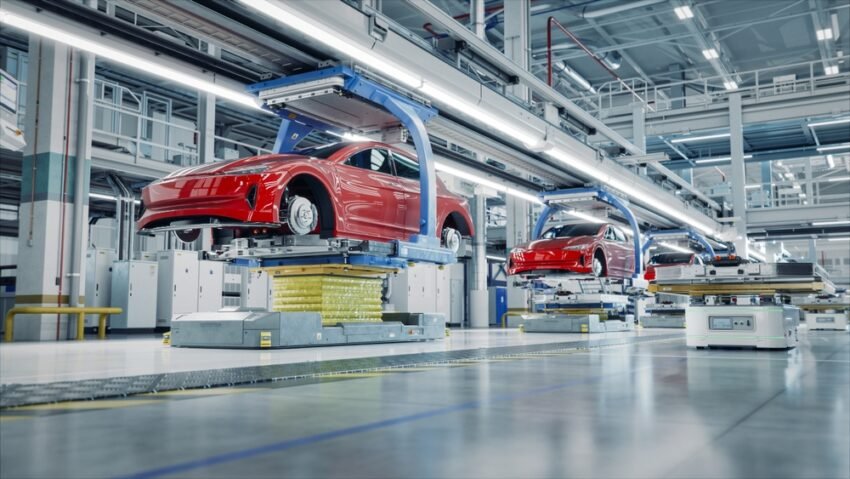Car production in the UK has plummeted to its lowest level since 1954, with just 779,584 units being produced in 2024—a sharp decline of 13.9% compared to the previous year. This drop marks a significant downturn, only rivaled by the decline seen during the height of the COVID-19 pandemic and the accompanying lockdowns.
The decline is a reflection of both subdued consumer confidence at home and a weakening global demand for British-made vehicles, with nearly 80% of cars produced in the UK being exported. Sales to key overseas markets have been especially disappointing, with exports to the European Union down by roughly a quarter and to China by around 20%. However, there was some positive news from the United States, where car exports saw a robust increase of 38.5%, possibly influenced by concerns over potential future tariffs.
The Society of Motor Manufacturers and Traders (SMMT), the industry body representing the sector, pointed out that the ongoing shift towards electric vehicles (EVs) has also contributed to the production slump. Major manufacturers like Jaguar and Nissan are in the process of launching new generations of electric vehicles to meet stringent environmental standards. By 2030, the UK aims to reduce new petrol and diesel car sales to 20% of the market, with a complete phase-out of all fossil fuel-powered cars, including hybrids, by 2035.
Significant investments in electric vehicle battery production are underway, including the establishment of new gigafactories. However, the UK is still far behind global leaders, ranking just below Slovakia in terms of production volume, and lagging considerably behind China. The Chinese automotive sector has reached an output of 27 million units annually, surpassing the combined output of the United States, Japan, India, and Germany.
Despite these challenges, Mike Hawes, Chief Executive of the SMMT, remains cautiously optimistic about the future. He highlighted that while production is expected to rise only slightly in 2025, the sector is on track to reach 1 million vehicles annually by 2030. “UK manufacturers are committed to transforming their factories with billions of pounds in investment to produce electric vehicles for the global market,” said Hawes. “The drop in production last year was inevitable given the scale of the transition, but with new models and battery production coming online, there is clear potential for growth.”
However, Hawes also pointed to the significant financial pressures facing the industry, as carmakers face penalties for not meeting the increasing quotas for battery electric vehicle (BEV) sales. In 2024, manufacturers are required to meet a BEV sales target of 22% of all their car sales, which is costing the industry an estimated £4bn in penalties. The target will rise to 28% in 2025, further complicating the market dynamics.
Car companies that fail to meet the required BEV sales quotas are charged up to £15,000 for each petrol or diesel vehicle sold—posing a significant financial burden, especially for luxury brands. This policy is contributing to market distortions, where manufacturers may be forced to reduce the production of traditional internal combustion engine models, leading to fewer available vehicles and higher prices.
A key issue remains the reluctance among many private buyers to embrace electric vehicles, with most BEVs being sold to business and fleet buyers who benefit from tax incentives. Following the closure of the Vauxhall plant in Luton by Stellantis last year, the government has launched a review of the zero-emission mandate, with an initial consultation set to close on February 18th. Any changes to policy could be announced in the summer.
Hawes has called for greater flexibility in the zero-emission mandate, suggesting that hybrid vehicles, which combine electric and petrol power, should be counted towards sales quotas, as is the case in the European Union. He also advocated for more affordable public charging infrastructure and additional incentives to encourage private buyers to make the switch to electric vehicles. The recent commitment of £65 million from Chancellor Rachel Reeves to fund additional kerbside charging points was welcomed by the industry.
Brexit continues to cast a shadow over the UK car industry, which remains reliant on trade with the European Union for components, skills, and investment. Industry leaders have called for the easing of trade barriers with the EU to help reduce costs and ensure smoother operations.
Overall, while the UK car industry faces a challenging landscape, there are hopes that the sector can navigate these hurdles with the right support and strategic planning. However, the optimism that characterized the industry in the early 2010s has given way to a more cautious outlook amid ongoing uncertainty.
For the latest updates on the UK’s automotive industry and economic trends, keep checking London Pulse News.


